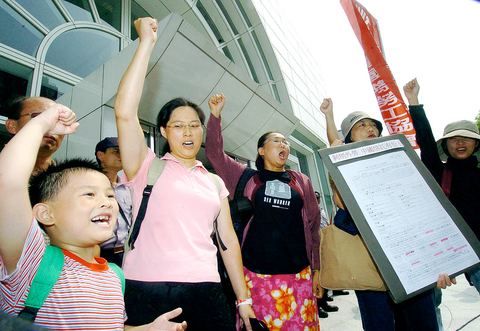Indonesian laborers and a human rights group protested yesterday in front of Chinatrust Commercial Bank's (
"Chinatrust imposes 19 percent interest rates on brokerage loans for the Indonesian laborers, which is as high as the rates for cash-advance cards," said Wu Jing-ru (
Currently, Indonesian workers are brought into Taiwan's job market under the "state-to-state importation" scheme, a system that involves the assistance of an embassy or representative office in Taiwan and its counterpart in the country of origin.

PHOTO: AFP
Under this system, Indonesians are required to pay a brokerage fee amounting to NT$49,787 (US$1,533), for taking out loans from the Chinatrust representative office in Indonesia, the Bank Chinatrust Indonesia, to come and work in Taiwan.
Including the 19 percent interest rate, processing fee and account management charge, these laborers will have to fork out a total of NT$70,545 (US$2,171) to pay off their loans, Wu said.
In response, Chinatrust said that the interest rates are imposed based on the situation in Indonesia, where banking institutions normally charge between 20 to 43 percent interest on consumer loans.
According to Jack Cheng (
"We are currently the only bank in charge of this loan operation, but we are not a monopoly as the Indonesian government is free to appoint other financial institutions as well," he said.
He added that further discussions between Chinatrust and Indonesian officials are under way.

‘SWASTICAR’: Tesla CEO Elon Musk’s close association with Donald Trump has prompted opponents to brand him a ‘Nazi’ and resulted in a dramatic drop in sales Demonstrators descended on Tesla Inc dealerships across the US, and in Europe and Canada on Saturday to protest company chief Elon Musk, who has amassed extraordinary power as a top adviser to US President Donald Trump. Waving signs with messages such as “Musk is stealing our money” and “Reclaim our country,” the protests largely took place peacefully following fiery episodes of vandalism on Tesla vehicles, dealerships and other facilities in recent weeks that US officials have denounced as terrorism. Hundreds rallied on Saturday outside the Tesla dealership in Manhattan. Some blasted Musk, the world’s richest man, while others demanded the shuttering of his

ADVERSARIES: The new list includes 11 entities in China and one in Taiwan, which is a local branch of Chinese cloud computing firm Inspur Group The US added dozens of entities to a trade blacklist on Tuesday, the US Department of Commerce said, in part to disrupt Beijing’s artificial intelligence (AI) and advanced computing capabilities. The action affects 80 entities from countries including China, the United Arab Emirates and Iran, with the commerce department citing their “activities contrary to US national security and foreign policy.” Those added to the “entity list” are restricted from obtaining US items and technologies without government authorization. “We will not allow adversaries to exploit American technology to bolster their own militaries and threaten American lives,” US Secretary of Commerce Howard Lutnick said. The entities

Minister of Finance Chuang Tsui-yun (莊翠雲) yesterday told lawmakers that she “would not speculate,” but a “response plan” has been prepared in case Taiwan is targeted by US President Donald Trump’s reciprocal tariffs, which are to be announced on Wednesday next week. The Trump administration, including US Secretary of the Treasury Scott Bessent, has said that much of the proposed reciprocal tariffs would focus on the 15 countries that have the highest trade surpluses with the US. Bessent has referred to those countries as the “dirty 15,” but has not named them. Last year, Taiwan’s US$73.9 billion trade surplus with the US

Prices of gasoline and diesel products at domestic gas stations are to fall NT$0.2 and NT$0.1 per liter respectively this week, even though international crude oil prices rose last week, CPC Corp, Taiwan (台灣中油) and Formosa Petrochemical Corp (台塑石化) said yesterday. International crude oil prices continued rising last week, as the US Energy Information Administration reported a larger-than-expected drop in US commercial crude oil inventories, CPC said in a statement. Based on the company’s floating oil price formula, the cost of crude oil rose 2.38 percent last week from a week earlier, it said. News that US President Donald Trump plans a “secondary